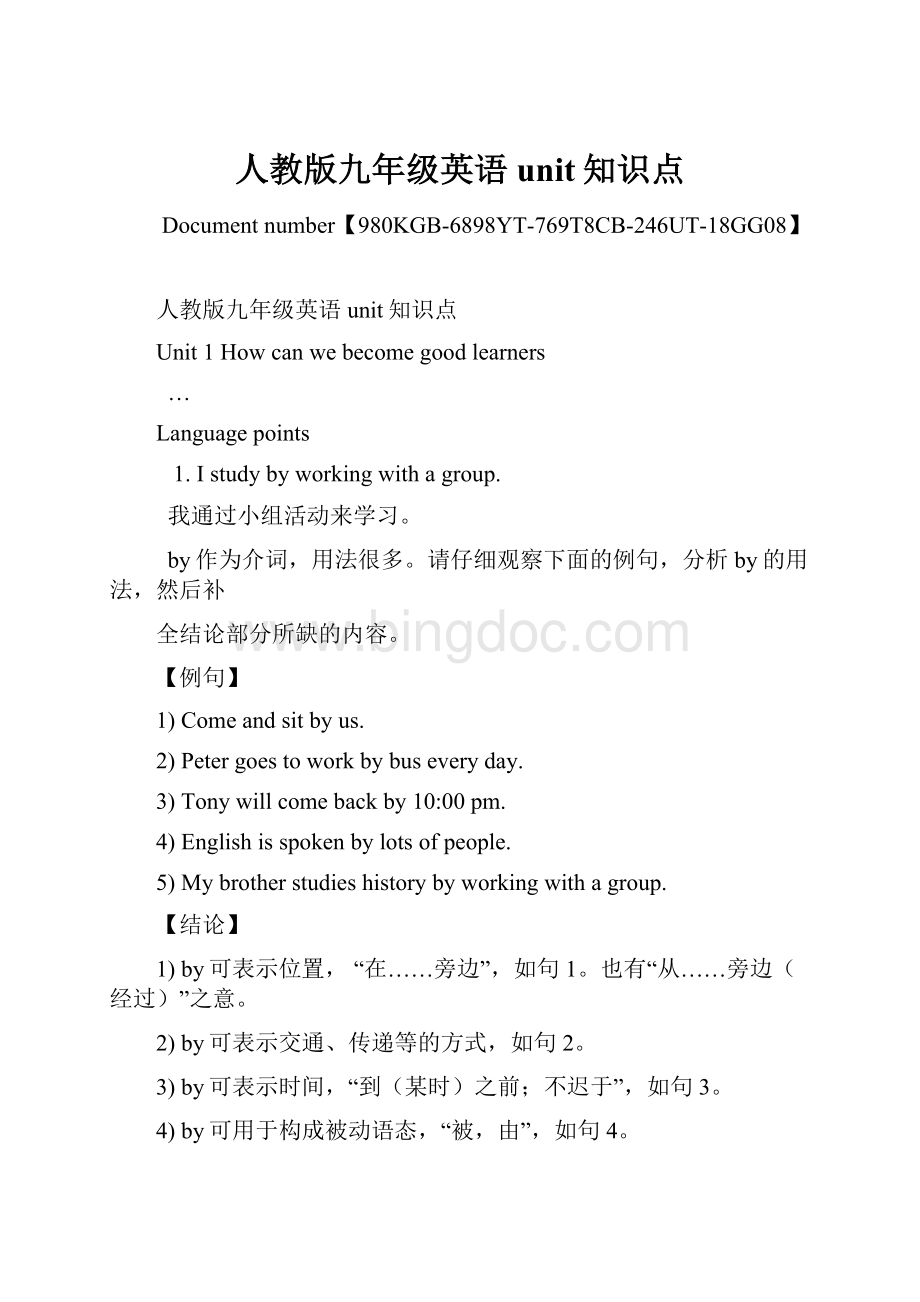 人教版九年级英语unit知识点.docx
人教版九年级英语unit知识点.docx
- 文档编号:2940250
- 上传时间:2023-05-05
- 格式:DOCX
- 页数:11
- 大小:24.50KB
人教版九年级英语unit知识点.docx
《人教版九年级英语unit知识点.docx》由会员分享,可在线阅读,更多相关《人教版九年级英语unit知识点.docx(11页珍藏版)》请在冰点文库上搜索。

人教版九年级英语unit知识点
Documentnumber【980KGB-6898YT-769T8CB-246UT-18GG08】
人教版九年级英语unit知识点
Unit1Howcanwebecomegoodlearners
…
Languagepoints
1.Istudybyworkingwithagroup.
我通过小组活动来学习。
by作为介词,用法很多。
请仔细观察下面的例句,分析by的用法,然后补
全结论部分所缺的内容。
【例句】
1)Comeandsitbyus.
2)Petergoestoworkbybuseveryday.
3)Tonywillcomebackby10:
00pm.
4)Englishisspokenbylotsofpeople.
5)Mybrotherstudieshistorybyworkingwithagroup.
【结论】
1)by可表示位置,“在……旁边”,如句1。
也有“从……旁边(经过)”之意。
2)by可表示交通、传递等的方式,如句2。
3)by可表示时间,“到(某时)之前;不迟于”,如句3。
4)by可用于构成被动语态,“被,由”,如句4。
5)by可表示方式或手段,by+V-ing形式”结构在句中作方式状语,“通过……方式(方法)”或“借助……手段”,如句5。
2.Whataboutreadingaloudtopracticepronunciation
大声朗读来练习发音怎么样
辨析aloud,loud和loudly
aloud出声地;大声地。
常与read/call等词连用,不用于比较级。
.Don’treadaloudinthelibrary.不要在图书馆大声朗读。
loud大声地;喧闹地。
指说话声和笑声,常与talk/speak/laugh/sing等词连用,常用比较级。
.Wecan’thearyou.Pleasespeaklouder.
我们听不到你的声音。
请再大声点。
loudly高声地;喧闹地。
可以和loud互换,含有“吵闹”的意思,不悦耳。
Whatabout/Howabout…
后跟名词,代词或。
用于征求意见。
.Whataboutacupoftea喝杯茶怎么样
Howaboutyou你呢
What/Howaboutgoingtothezoothisafternoon
今天下午去动物园怎么样
3.It’stoohardtounderstandspokenEnglish.
句中的it是形式主语,不定式短语tounderstandspokenEnglish是真正的主语。
该句句型为:
It’s+too+adj.+(forsb.)+todosth.意思是“(对某人来说)做某事是……的”。
如:
It’stooimportanttokeephealthy.
It’sdifficultforhimtolearntwolanguages.
【链接】
too...to...结构常表示“太……而不能……”,too后面接形容词或副词,to后面接动词原形。
如:
Theroomistoodirtytolivein.
Hewalkstooslowlytogetthereontime.
【运用】
将下面的句子翻译成英语。
1)孩子们在那条河里游泳是危险的。
It’sdangerousforthechildrentoswiminthatriver.
2)晚饭后散步太有必要了。
It’stoonecessarytotakeawalkaftersupper.
3)水太烫,不能喝。
Thewateristoohottodrink.
1.WhydidWeiFenfinditdifficulttolearnEnglish
finditdifficult/hardtodosth.发现做某事很困难
【find用法归纳】
findsb.doingsth.发现某人做某事
findit+adj.+todosth.发现做某事很……
findit+adj.todosth.中的it是形式宾语,adj.做宾补,todosth.是真正的宾语。
同类的动词还有think,feel,consider等。
2.ButIwasafraidtoaskquestionsbecauseofmypoorpronunciation.
beafraidtodosth.害怕去做某事
【afraid用法归纳】
beafraidofsth./doingsth.害怕做某事(担心出现某种不良后果)
beafraidtodosth.害怕去做某事(“怕”或“不敢”去做某事)
beafraid+that恐怕……(礼貌地说出令人不快、失望或感到遗憾的事)
3.ThenonedayIwatchedanEnglishmoviecalledToyStory.
called=named叫做
【call用法归纳】
callsb.=telephonesb.=phonesb.=givesb.acall=ringsb.up
给某人打电话
callonsb.拜访某人
4.Idiscoveredthatlisteningtosomethinginterestingisthesecrettolanguagelearning.
discoverv.发现;发觉
指偶然或经过努力发现原来客观存在但不为人所知的事物。
.ColumbusdiscoveredAmericain1492.哥伦布于1492年发现了美洲。
5.Ialsolearnedusefulsentenceslike“It’s
apieceofcake”or“Itservesyouright.”
apieceofcake和servessb.right是英语中的两个习惯用语,也可称作习语idiom(s)。
同汉语中的成语类似,习语是人们在长期的语言运用中约定俗成的一种固定表达方式,其意思往往不是字面所表达的含义。
如:
apieceofcake表示事情非常简单、易于解决,相当于汉语的“小菜一碟;小事一桩”;servessb.right则相当于汉语说某人“活该”。
6.ButbecauseIwantedtounderstandthestory,Ilookedthemupinadictionary.
lookup(在词典、参考书中或通过电脑)查阅;抬头看
【look用法归纳】
lookafter照顾
looklike看起来像
lookout当心,小心
lookthrough浏览
lookfor寻找
lookforwardto期待
lookaround向四周看
have/takealook看一看
lookover检查
1.Itisalsoeasierforyoutopayattentiontoitforalongtime.
该句句型是Itisadj.forsb.todosth.
【注】若形容词表示事物特征的,如:
easy,difficult,?
hard,important等,须用介词for。
?
It’s?
+adj.(kind,?
honest,?
friendly)+(of?
sb.)?
to?
do?
sth.?
【注】若形容词表示人的性格、品质与特点,如:
good,kind,nice,?
wrong等,用介词of。
2.Goodlearnersoftenconnectwhattheyneedtolearnwithsomethinginteresting.
connectv.意为“连接;与……有联系”
当表示把两个物体(A和B)连接起来时,常用结构是connectAto/with/andB,其中to表示把A接到B上,多用来指动作而不指状态。
.Connectthespeakerto/withtherecordplayer,please.
Thesubwayconnectsthetrainstationand/withtheairport.
3.Good?
learners?
think?
aboutwhat?
they?
are?
good?
atand?
what?
they?
need?
to?
practice?
more.
【think相关短语】
think?
about?
想起,考虑
think?
of?
想到,认为
think?
over?
仔细考虑
think?
out?
考虑好
think?
up?
想出来
think?
through?
认真地考虑
4.Evenifyoulearnsomethingwell,youwillforgetitunlessyouuseit.
even?
though=even?
if?
即使,引导让步状语从句
【注】even?
though?
引导让步状语从句时,不能与but连用。
5.…,theyarenotafraidofmakingmistakes.
(1)be?
afraid?
of?
sth/doing?
sth害怕做某事,担心(出现某种不良后果)。
?
(2)be?
afraid?
to?
do?
sth?
害怕去做…,“怕”?
或“不敢”去做某事。
(3)be?
afraid?
+that?
恐怕…,用于礼貌地表达可能令人不愉快的消息。
(4)?
回答别人的提问时,可用省略形式I’m?
afraid?
so(not)。
6.Theyevenaskeachotherandtrytofindouttheanswers.
(1)try?
on?
试穿?
(2)?
try?
to?
do?
sth.?
努力做某事,侧重尽力做
(3)?
try?
doing?
sth.?
试图做某事,侧重尝试做
(4)try?
one’s?
best?
to?
do?
sth.=?
do?
one’s?
best?
to?
do?
sth.?
尽某人最大努力做某事
find?
out寻找,查明
【拓展】find/look?
for/find?
out?
找
(1)find?
v.找到,强调找到的结果?
(2)look?
for?
寻找,强调找东西的过程
(3)?
find?
out?
查明,找到,指经过调查,询问等弄清事实的真相
7.Butwhetherornotyoucandothiswelldependsonyourlearninghabits.
1)此句中whetherornotyoucandoitwell是个从句,用作整个句子的主语。
这种从句叫作“主语从句”。
又如:
Whetheryoudiditrightorwrongisn’tsoimportant.What’simportantisthe
experienceyougained.
2)whetherornot是英语从句的一个连词结构,意思和功能相当于whether,表示“是否”,常出现在宾语从句,主语从句中。
使用时,也可把whether和ornot分开,ornot放到句尾。
例如:
Ican’ttellwhetherornottheteacherlikesme.此句也可以写成:
Ican’ttellwhethertheteacherlikesmeornot.
8.Knowledgecomesfromquestioning.question在句子中作动词,是“质疑;质问;
提问”的意思。
例如:
Ijustacceptedwhathetoldme.Ineverthoughttoquestionit.
当question用作动词,表示对某人或事物进行提问时,是一种十分正式的用法,有“提问;询问;审问”的意思。
例如:
Thepolicequestionedhimforthreehoursbeforelettinghimgo.
9.secret秘密,秘诀;秘密的,保密的keepasecret保密thesecretto………的秘诀letoutasecret泄露机密
重复,重做repeat本身包含“重,又,再”的含义,故不可与again连用。
11.increase增加,增长increaseby增加了(后接差额,倍数或百分数)increaseto(后接总数,即原有部分与所加部分的总和)
(使)连接,与……有联系connect…with…把……和……连接起来connect…to…把……连接到……
知识,学问是不可数名词,但有时可加不定冠词,意为“对……有某种程度的了解”,knowledge不能作learn的宾语,只能说getsomeknowledge.
Grammar
HowdoyoulearnEnglishIlearnbystudyingwithagroup.
DoyoulearnEnglishbyreadingaloudYes,1do.Ithelpsmypronunciation.
HowcanIreadfasterYoucanreadfasterbyreadingwordgroups.
HowcanIimprovemypronunciationOnewayisbylisteningtotapes.
动名词
定义:
它是一种兼有动词和名词特征的非谓语动词形式。
基本形式:
V-ing
作用:
动名词具有名词的性质,在句中可以做主语、表语、宾语、定语等。
动名词的基本用法
1.用作主语
所表动作比较抽象,或者泛指习惯性的动作。
.Playingwithfireisdangerous.
注意:
动名词做主语,有时先用it作形式主语,把动名词置于句末。
这种用法在习惯句型中常用。
1)Itisnouse/good/useless+doing…
2)Itisawasteoftime+doing…
3)Itisfun+doing…
在以上结构中常用动名词作主语。
.It’snousecryingoverspiltmilk.(覆水难收)
Thereisnojokingaboutthematter.
Itisfunplayingwithchildren.和孩子们一起玩真好。
2.用作宾语
1)作动词的宾语
常见的此类动词有:
practise,enjoy,finish,giveup,cannothelp,keep,keepon,mind,miss,putoff,dependon,thinkabout,succeedin,worryabout,beusedto,getusedto,lookforwardto,payattentionto等。
.Howdoyoupracticespeaking
Ihavetofinishreadingabookandgiveareport.
2)作介词的宾语
1.IlearnEnglishbydoinggrammarexercises.
2.Shallwehavearestorgetdowntodoingourwork
3.Hewaslateagainbecauseofgettinguplate.
4.Lockthedoorsandwindowsbeforegoingout.
5.What/Howaboutthetwoofusplayinggames
3)既可接动名词又可接不定式的常用动词有:
remember,forget,regret,mean,try等,但表达的意义不同。
.Irememberseeingheratthehotel.
我记得在宾馆见过她。
(动作发生了)
Iwillremembertoseeheratthehotel.
我记着要去宾馆见她。
(动作尚未发生)
remember/forget/regrettodo动作尚未发生
doing动作已经发生
trytodo设法、努力去做,尽力
doing试试去做(看有何结果)
meantodo打算做(主语一般是人)
doing意味着(主语一般是物)
regrettodo对将要做的事抱歉
doing对已经发生的事感到后悔
stoptodo停下去做另外一件事
doing停止做手头的事情
3.作表语
动名词作表语时句子主语常是表示无生命的事物的名词或what引导的名词性从句。
表语动名词与主语通常是对等的关系,表示主语的内容,主语、表语可互换位置。
.Yourtaskiscleaningthewindows.
你的任务就是擦窗户。
(Cleaningthewindowsisyourtask.)
WhatIhatemostisbeinglaughedat.我最痛恨的就是被别人嘲笑。
(BeinglaughedatiswhatIhatemost.)
动名词有时态和语态的变化。
动名词的时态和语态的基本形式:
(以write为例)
时态
语态
一般时
完成时
主动语态
writing
havingwritten
被动语态
beingwritten
havingbeenwritten
注意:
动名词的否定形式是:
notwriting
动名词的复合结构:
动名词的逻辑主语+动名词=动名词的复合结构
Wouldyoumind_____(我开窗户吗)
Wouldyoumindmy/meopeningthewindow
my/me称为动名词的逻辑主语。
Ican’tunderstandJack/Jack’sleavinghiswife.
Ican’tunderstandhis/himleavinghiswife.
Jack’s/Hisleavinghiswifeisunbelievable.
- 配套讲稿:
如PPT文件的首页显示word图标,表示该PPT已包含配套word讲稿。双击word图标可打开word文档。
- 特殊限制:
部分文档作品中含有的国旗、国徽等图片,仅作为作品整体效果示例展示,禁止商用。设计者仅对作品中独创性部分享有著作权。
- 关 键 词:
- 人教版 九年级 英语 unit 知识点
 冰点文库所有资源均是用户自行上传分享,仅供网友学习交流,未经上传用户书面授权,请勿作他用。
冰点文库所有资源均是用户自行上传分享,仅供网友学习交流,未经上传用户书面授权,请勿作他用。


 建筑工程编制依据及概况.docx
建筑工程编制依据及概况.docx
